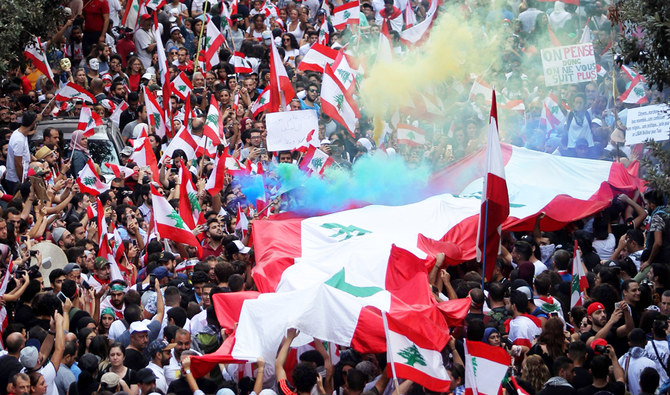
- ARAB NEWS
- 02 Jul 2025

Najia Houssari
BEIRUT: Lebanese protesters are determined to continue with their activities even after the expiry of a 72-hour deadline, given by Prime Minister Saad Hariri to his partners in power, to agree to reforms to save the country from economic turmoil, which ends on Monday at 7 p.m. “The people want everyone in power to resign and not only the prime minister. They want a mini technocrat government whose goal is to establish an electoral law that will ensure proper representation, to hold early parliamentary elections and elect a new president,” said Mahmoud Fakih, protesting in Beirut’s Riad Al-Solh Square.
Fakih called on politicians to “not bet on the waning of the momentum of the protests in the street. The more you speak, the more the people will reject you, that is what we saw after the televised speech of Hezbollah’s secretary-general, Hassan Nasrallah, on Saturday. The Lebanese people saw the results of his party’s presence in power.”
The protests, now into their fourth day, have heard chants of “the people want to topple the regime.”
Protesters have been waving Lebanese flags at the central sit-in in Beirut. Tents belonging to activists have been erected, distributing the flags, as well as hats and water bottles free of charge to the public.
“We are paying from our own money and we are not resorting to any external funding so that no one can say that there are outsiders behind our action. We will continue to support people as long as people continue to take to the streets,” said activist Karl Abu Malhab.
The protesters have devised various ways to express their peaceful movement, through colorful dress and painted faces, as well as through vast Lebanese flags extending dozens of meters, and through the dabkeh dances. Some have even taken pets with them, and set up barbecues and grills.
Sarah Sultan, who came to the protests with her husband Abdul Rahman, called for an end to the Taif agreement, because it divided the country into sectarian and partisan quotas. “We have to hold accountable those in power, even the directors general of public departments,” she told Arab News. “These protests shall not end, because people are suffering,” Rahman added.
Aref Jouaidi and his wife Kawthar brought their baby twins to Riad Al-Solh Square. Aref said: “I am here because of my children — I want them to have a better future. We want to cleanse the power of the corrupted. I will continue to protest — already there is no work and we lose trade for our business every day.”
Another protester, Ryan Al-Habal, said that he did not belong to any political party. He took to the street, he said, because he “saw on TV how the barrier of fear of expressing our opinion toward politicians and party leaders broke. We have full freedom to express our suffering. People no longer tolerate the politicians because they have brought us to ruin.”
Darine Dandashli, an activist distributing Lebanese flags, said: “The activists are paying out of their own pocket — I have so far paid $1,000 — as we do not want anyone to distort our movement. It started as a spontaneous civil movement that needs now some organization.
“We are forming committees of activists, one to take over the streets, one to handle logistics, and another that will work out an alternative solution by explaining people’s demands in an economic and political working paper. There is also a constitutional committee working on how to move after the resignation of the current government to an interim government whose role is limited to holding early parliamentary elections whose members are from outside the ruling authority,” explained Dandashli.